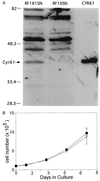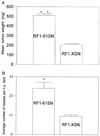CYR61, a product of a growth factor-inducible immediate early gene, promotes angiogenesis and tumor growth
- PMID: 9600969
- PMCID: PMC27701
- DOI: 10.1073/pnas.95.11.6355
CYR61, a product of a growth factor-inducible immediate early gene, promotes angiogenesis and tumor growth
Abstract
CYR61 is a secreted, cysteine-rich, heparin-binding protein encoded by a growth factor-inducible immediate-early gene. Acting as an extracellular, matrix-associated signaling molecule, CYR61 promotes the adhesion of endothelial cells through interaction with the integrin alphaVbeta3 and augments growth factor-induced DNA synthesis in the same cell type. In this study, we show that purified CYR61 stimulates directed migration of human microvascular endothelial cells in culture through an alphaV beta3-dependent pathway and induces neovascularization in rat corneas. Both the chemotactic and angiogenic activities of CYR61 can be blocked by specific anti-CYR61 antibodies. Whereas most human tumor-derived cell lines tested express CYR61, the gastric adenocarcinoma cell line RF-1 does not. Expression of the CYR61 cDNA under the regulation of a constitutive promoter in RF-1 cells significantly enhances the tumorigenicity of these cells as measured by growth in immunodeficient mice, resulting in tumors that are larger and more vascularized than those produced by control RF-1 cells. Taken together, these results identify CYR61 as an angiogenic inducer that can promote tumor growth and vascularization; the results also suggest potential roles for CYR61 in physiologic and pathologic neovascularization.
Figures





References
Publication types
MeSH terms
Substances
Grants and funding
LinkOut - more resources
Full Text Sources
Other Literature Sources

